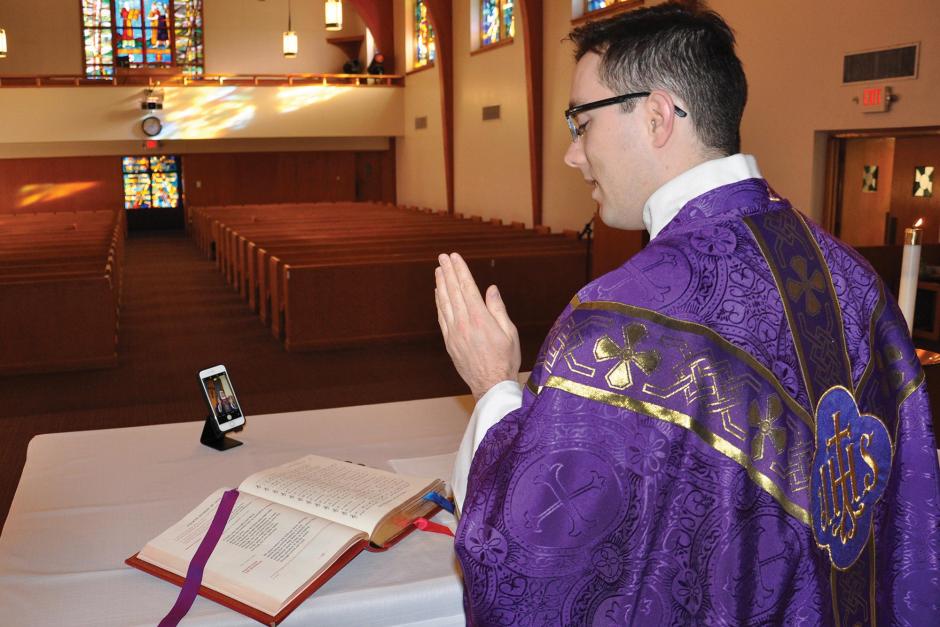Are Churches Essential Services?
Alan J. Reinach July/August 2020The nation has been in lockdown, sheltering in place; yet a small number of pastors appear defiant, insisting on their First Amendment rights to conduct religious services in person. A dozen or more states have included churches as essential services and actually permit churches to meet, while the remaining states forbid religious gatherings, even small-group in-home gatherings.
Meanwhile, is anyone asking the key question: What is essential about church? For those of us who believe, the answer is: much, in every way, but not necessarily tied to the building.
Essential, for example, is faith itself—the belief in an omnipotent God who knows the end from the beginning and who holds our lives in His hands. Essential is our faith in God’s grace—that we receive incredibly generous grace far beyond what we deserve. Also essential is the community of faith—the encouragement we receive from one another, the relationships and commitment. In ordinary times this community centers in the physical building. But in crisis times the building becomes superfluous. We always knew the church was not the building.
Now we get to put that belief to the test. We get to discover what the church really consists of. We can’t just drift along, business as usual—we have to make an effort to connect with one another, to support one another, to make community work.
What is not essential is putting the lives of church members at risk in order to exercise our First Amendment rights to assemble and worship in the same physical space. It doesn’t matter how careful we intend to be. The Presbyterian choir in Mount Vernon, Washington, thought they were being careful—social distancing and all that. Yet 45 out of 60 who showed up for choir practice later tested positive for the virus. Two died. Pastors around the nation are breathing a sigh of relief that this didn’t happen in their church, while also praying for the choir members.
Legal scholars generally agree that First Amendment interpretation does not require states to grant churches an exemption from shelter-in-place restrictions—nor does it require they be considered essential services. This is not to undermine the importance of religious freedom.
We have ceded considerable authority to government to lead us out of this crisis. The danger is always that such authority, once obtained, will be yielded slowly, if at all. There will come a time to vigorously reassert all of our fundamental rights, including our religious freedom. But that is later, when we are on the downward slope of the curve.
For now, pastors considering conducting Easter services should consider the teachings of their own Scriptures. In Leviticus 13 Israel was instructed in the methods of quarantine for contagious disease. Those removed from the community were also denied access to religious services—and they didn’t have livestreamed alternatives! Once the danger was past, they were certified by the priests, bathed and cleansed, and restored to the community. Then they could again worship in person.
The commandment to love your neighbor as yourself is found in Leviticus 19, as well as the New Testament. A lawyer asked Jesus the question “Who is my neighbor?” but he didn’t like the answer. His neighbor, Jesus said, included the hated Samaritan. Today your neighbor is the person who may catch the virus at the grocery store, the gas station, or wherever else you venture forth after catching the virus in church. Churches demanding to exercise their First Amendment rights to meet in person may well be violating this basic moral teaching.
Pastors should also grasp the urgency of the hour. We need to defeat the epidemic and soon. The economic fallout is hitting our families hard, with far- ranging consequences impacting religious institutions, including schools. What happens if schools can’t reopen on time in the fall? Or families can no longer afford tuition? The times call for religious leaders to exercise civic responsibility and tell everyone just to stay home!
These are extraordinary times, calling for extraordinary measures. The gospel does not require peace and prosperity to thrive—actually, the opposite seems to be the historic norm. Indeed, the Bible teaches that God’s strength is perfected in weakness. It is well for us to keep watch for the erosion of our rights and freedoms. But a temporary restriction on churches meeting is not the danger. If ever there was a time when all Americans can and should agree on a “pro-life” ethosprotecting the living—it is now.
Article Author: Alan J. Reinach
Alan J. Reinach is Executive Director of the Church State Council, the religious liberty educational and advocacy arm of the Pacific Union Conference of Seventh-day Adventists, representing five western states: Arizona, California, Hawaii, Nevada and Utah. His legal practice emphasizes First Amendment religious freedom cases, and religious accommodation cases under Title VII of the Civil Rights Act of 1964 and related state civil rights laws. Reinach is also a Seventh-day Adventist minister who speaks regularly on religious freedom topics, and is the host of a nationally syndicated weekly radio broadcast, “Freedom’s Ring.” He is the principal author and editor of Politics and Prophecy: The Battle for Religious Liberty and the Authentic Gospel, and a frequent contributor to Libertymagazine.
